
5 Jedi Mind Tricks to Beat Your Food Addiction and Stop Emotional Eating
Food is a Drug
Food is a drug. This is an undeniable fact.
You can become physiologically addicted, like cocaine.
The body shows withdrawal symptoms, like cocaine.
And the body shows a “high” in the brain after consuming food, like cocaine.
Eating when you’re emotional produces real, physiological relief like taking a Valium.
These are all facts.
So why are people still suggesting to use willpower and discipline to fight cravings and beat the addiction to food?
If we know that we wouldn’t ever give a drug addict the advice to “fight the craving” – why would we continue to give people who are addicted to food the same advice?
It’s simple: the people who suggest that you use discipline obviously have never suffered from this, and they don’t truly understand the underlying science. It’s cheap self help with no tested formula.
5 Jedi Mind Tricks
Your entire approach has to be different from just “fighting it.”
Drug addicts have to learn that hanging out with their old friends doesn’t work anymore. They need to change who they associate with – they do this because they know that once they see friends doing drugs or smoking cigarettes, chances are they’re going to want to, too.
You’re fighting a real addiction. You have no choice but to think “smart” about how to beat it.
What I offer here are ways to manage – not some miracle cures.
For many people truly addicted to food, there is no such thing as moderation.
And generally, these fall into three broad categories: behavioral shifts like changing your habits and routines.
Cognitive shifts, which involve your thinking about food.
And then nutritional shifts, which involve changing what kinds of foods you eat, and when.
These all truly revolve around training your mind in various ways to be more aware. Without awareness, it’s tough to change.
So here are the 5 Jedi mind tricks that actually work.
Mental Hack #1: Figure Out Your Eating Type… And Then Dominate It
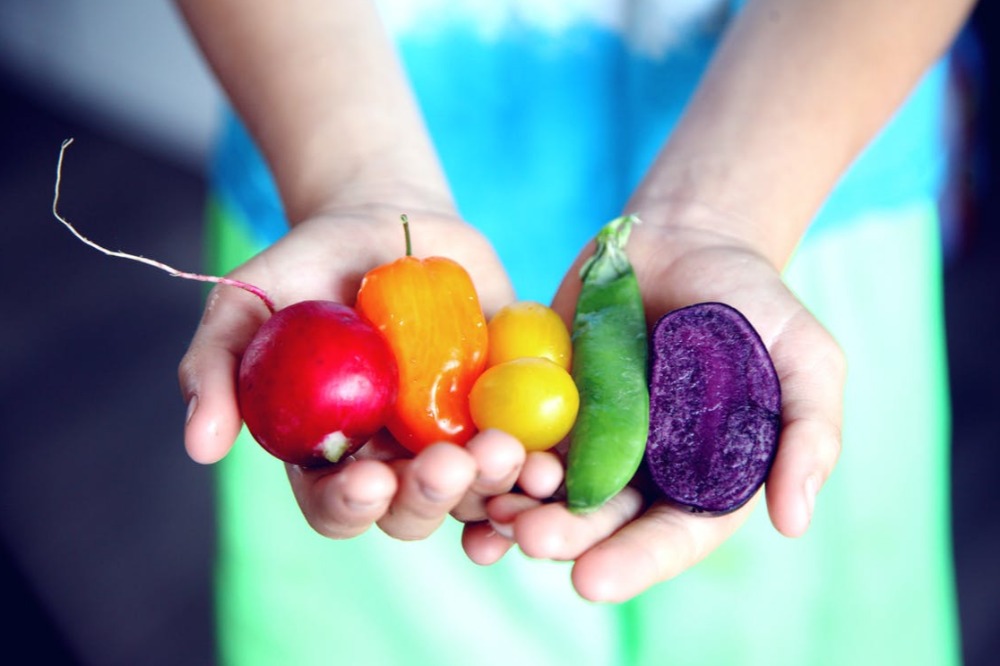
In Mindless Eating, by Brian Wansink, PhD, he cleverly put many of us into five main categories based on our eating habits.
Although the categories aren’t new, he put some clever names that help you remember which kind of eater you are.
He breaks people down into 5 common groups:
A. The meal stuffer. Meal stuffers eat primarily during mealtimes, but they stuff themselves and eat to excess. They often eat so quickly that they’re uncomfortably full after. These are the kids we often say have “good appetites.” They often go back for seconds.
B. Snack grazer. Snack grazers reach for food whenever it’s available. Convenience is usually the main reason – in other words, food is available and they just constantly reach for it as long as it’s there. Snacking is sometimes a nervous habit or something they do when bored. Sometimes they snack as an excuse to get up and walk around, or they just feel “bored” when watching tv or reading.
C. The party binger. Party bingers are usually professionals or people in corporate environments. Food is either a backdrop for business or fun, and it’s easy to lose track of how much they eat or drink. Lots of social events and business meetings means lots of food and eating out.
D. The restaurant indulger. Restaurant indulgers are people who frequently eat out a lot at restaurants. Sometimes these are just young college kids, other times they’re young professionals who work a lot and don’t want to/don’t have the time to cook. Thus, they eat out 3x a day.
E. Desktop/dashboard diner. Desktop diners speed eat while multitasking on the computer or driving. They usually do it to save time, but also do it just to avoid the hassle of getting a real lunch. They’re not busy, they’re just unmotivated. When you ask them why they don’t just cook their own food or go get a real meal, they say “Eh….”
————————
So now you know your eating type. You know your own kryptonite. You know for example you’re a desktop diner. You know you are highly unlikely to actually eat a full meal while at work – and that you end up eating a few candy bars throughout the day from the vending machine, leaving you starving for dinner (even though you ate 1,000+ calories).
You know you are prone to not being prepared for lunch. And you know that you usually feel too “lazy” to go out for a meal and end up feasting on the vending machine. So what can you do?
You can consciously prepare lunch beforehand and bring it.
You can set a personal “rule” for yourself – make yourself go out to lunch with people at least twice a week.
Or you can set a rule where you don’t let yourself eat at your desk – to ensure that you formally have some kind of lunch.
Let’s say you’re a grazer.
You know you constantly reach for food throughout the day and rarely eat a full meal. You also know that if there’s a candy dish, you’re probably going to constantly have your hand it in throughout the day.
With that new awareness, you can do a couple things:
Set an alert on your iPhone to remind yourself every 3 hours to eat a meal.
Never, ever carry snacks with you – forcing yourself to eat meals regularly.
Avoid situations where you’ve got the opportunity to constantly have your hands in the cookie jar.
So, here’s mental hack #1: Learn your eating type (AKA your kryptonite) and then be prepared for those situations by having escape plans and strategically building your day around them.
Mental Hack #2: Emotional Learning

For many (most?) of us, emotional eating has become a habit of comfort – in other words, it’s a behavior induced by certain cues like situations, feelings, people, commercials, etc.
In studies, animals & people that were more stressed ended up eating more and getting fatter.
In the vast majority of people, uncontrolled eating happens in two (emotion-related) situations:
- Boredom (“I’m just sitting watching TV and eating”)
- Stress events (“I feel bad, so I eat”)
So here’s how you use emotional learning to take the smart approach to beating food addiction, which ultimately revolves around your habits.
I’ve previously talked about this quite a lot in a post called ‘Why all diets fail and why you don’t need a diet to lose weight, but here’s a recap for emotional eaters.
#1 Figure Out Your Cues
Most of us emotionally eat because of cues outside or inside of us.
For example: we’re at a company party. Food is there, so we eat it (availability – external cue).
Another example: It’s 2:30 at work, and you’re on the home stretch. You start getting low energy, and you’re looking for something to do – so you go upstairs to the cafe and grab a cookie (low energy – internal cue).
So the secret for many of us is to A. learn our cues, and then B. avoid them.
A technique I commonly recommend for figuring out your cues is what I call the Awesomesauce Index Card Method.
If you’re interested in that, check out this post on food addiction and sugar cravings.
But to keep it simple, spend time for 1-2 weeks recording a few things:
- What time of the day do I crave food?
- What moods make me crave food? (Usually boredom and stress)
- In what situations do I usually over eat?
- With what people do I usually eat the wrong foods?
- What places usually end up causing cravings? (E.g. do you pass by the bakery every day at 4:30 and have to stop to get something?)
#2 Swap The Routine
Another incredibly common origin of bad habits is boredom.
I once was working with a stay at home mom who had sugar cravings, and after doing the index card exercise for 1-2 weeks (see above), she realized that almost all of her sugar consumption happened when when was “bored” or wanting something to do.
While watching TV mindlessly, surfing the internet, or just hanging out around the house, she just wanted something to do – which ended up turning into a massive sugar consumption habit.
Fortunately for her, once she figured out the cue, she changed the routine.
So, let’s say you know that you eat food when you’re bored. You can do #1 (avoid being bored), or when you’re bored (and realize it), start doing something that gives you something to do.
For example: If, at work, 2:30 hits and you’re getting a bit bored and tired, and you know you usually go up to the cafe for a snack, find something to do that stimulates you. Maybe that means stopping over at a friend’s desk to chat for a while, or maybe that means just strategically placing your lunch break later in the day, or maybe that means saving your most interesting projects for around that time to keep your brain focused.
Strategy #2 all revolves around three things: the emotion you’re feeling, why you’re feeling it, and finding things that truly address the underlying cause (e.g. boredom).
[ For more reading: Check out these three posts ]
- Why All Diets Fail & Why You Don’t Need a Diet to Lose Weight
- Three Scientifically Proven Ways to Kick the Crap Out of Sugar Cravings
- How Big Business Makes Food as Addictive as Cocaine
Mental Hack #3: Cognitive Control

Cognitive control revolves all around how you view food, and I divide it into two broad categories:
- Mental chatter
- Personal rules
There’s often a lot of self-talk going on when we try to fight foods (or fight anything, really). And what usually ends up happening is that the more time we try to talk ourselves out of something, the stronger it becomes and the more it steals our attention.
Ever tried jumping off a high rock? The longer you wait and talk yourself up, the less chance you will actually jump.
One of the easiest things you can do in regard to your mind is change the mental chatter.
Rather than looking at cookies and ice cream and saying to yourself, “Oh man those look good,” tell yourself the truth, “I know I can’t just have one bite… I’m going to eat 20,” and even remind yourself of your goals, “tomorrow I’m going to feel like crap and totally regret this.”
Jon Grant, at the university of Minnesota, asks patients with a history of shoplifting to write out a shopping list before they go to the grocery store and just put two items on the list: handcuffs, to remind them of their previous history, and a bologna sandwich, to remind them of what they were eating in jail.
Basically this just jogs their memory and reminds them of the consequences of their behavior, and similar to saying “I’ll feel terrible after eating cookies,” it instills a sense of guilt beforehand. (Hat tip to The End of Overreating for this anecdote).
Setting rules for your food is another way to beat using willpower.
For example, you can make rules like “I don’t eat french fries,” or “I don’t snack.”
Rules actually aren’t using willpower – and they can quickly become habits which bypass willpower altogether.
It’s best just to pick 2 or 3 rules to stick to, that you can apply in a variety of situations. Better yet, check out hack #1, find your eating type, and set rules based on what type of eater you are.
My own favorite personal rules? I don’t eat french fries or any fried foods and don’t snack.
These quickly become a part of your identity, and when you say “I don’t eat french fries” it ends the conversation and doesn’t require any fighting whatsoever.
Mental Hack #4: Leveraging Social
Your social networks can fuel your food addiction and contribute to being overweight.
A study done in the New England Journal of Medicine found that social networks can promote obesity – people with friends, siblings and spouses who are obese are much more likely to be obese themselves.
Now, although this wasn’t in reference to online social networks (where people may not see each other in reality), there is evidence that shows that you’re many times more likely to share the same interests as your friends.
This is just the long way of saying that people have a huge influence over your success or failure, and you’re likely to end up like the people around you in more than one way.
———
You can leverage the internet social spheres in your favor too. There are a couple innovative sites to help you integrate a positive social environment with your own personal goals.
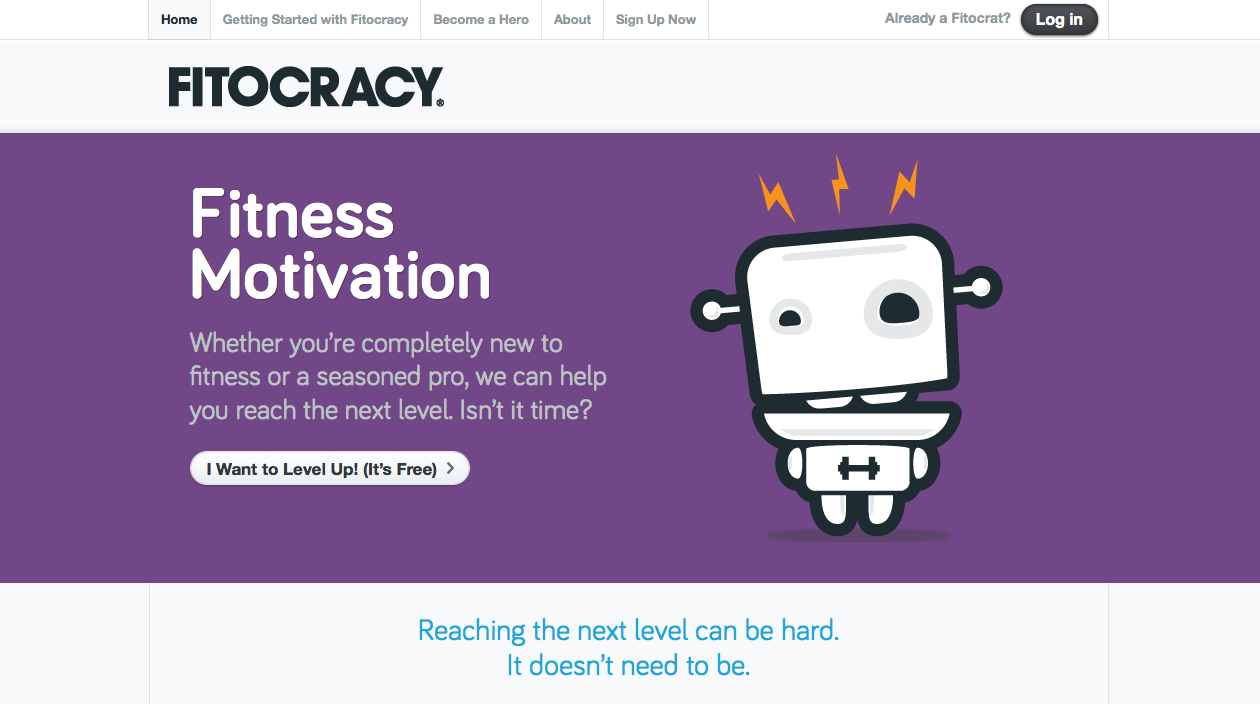
Fitocracy in a nutshell: It’s health and fitness, gamified. You earn points for doing “quests” (aka certain workouts/objectives/goals), and then you can level up and reach new levels.
It integrates with a social feed like facebook, and lets others motivate and help each other out.
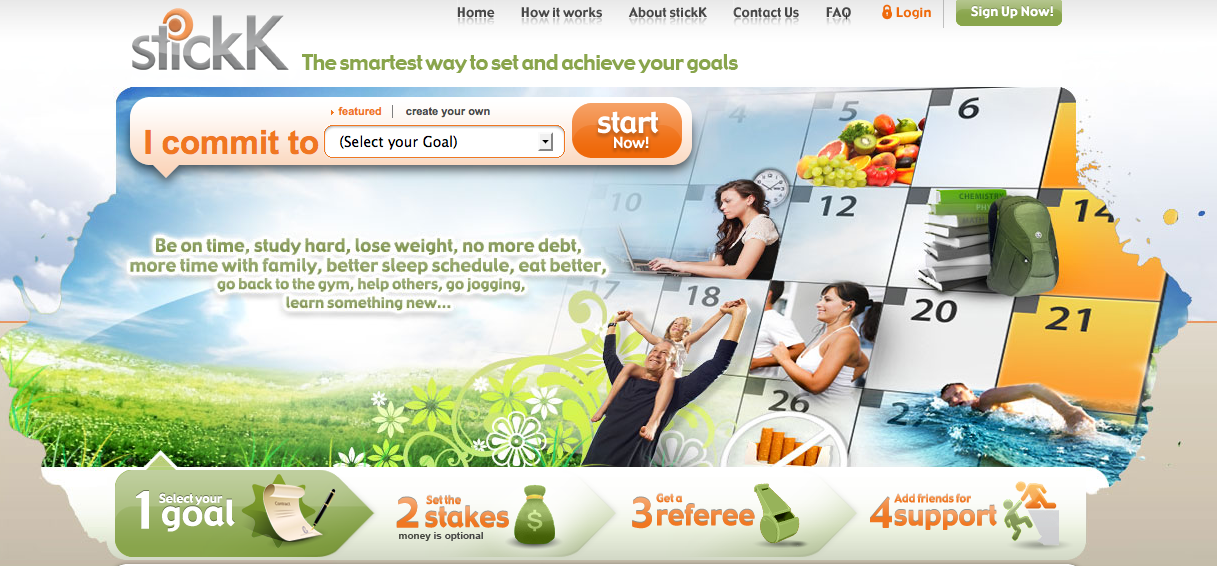
Stickk in a nutshell: Stickk is another way to socially integrate betting with attaining your own goals.
It’s based on the whole “carrot and stick” theory of motivation – that to motivate people, you can offer them incentives ($$$), or punish them.
In Stickk, you set a goal, and then pick your stakes: if you fail to reach your goal, your money will automatically be sent to either a friend, a charity, or better yet – an anti-charity, aka a charity you hate.
The key is to pick a charity you hate so much that you’d rather die than see your money go there 😉
It works!
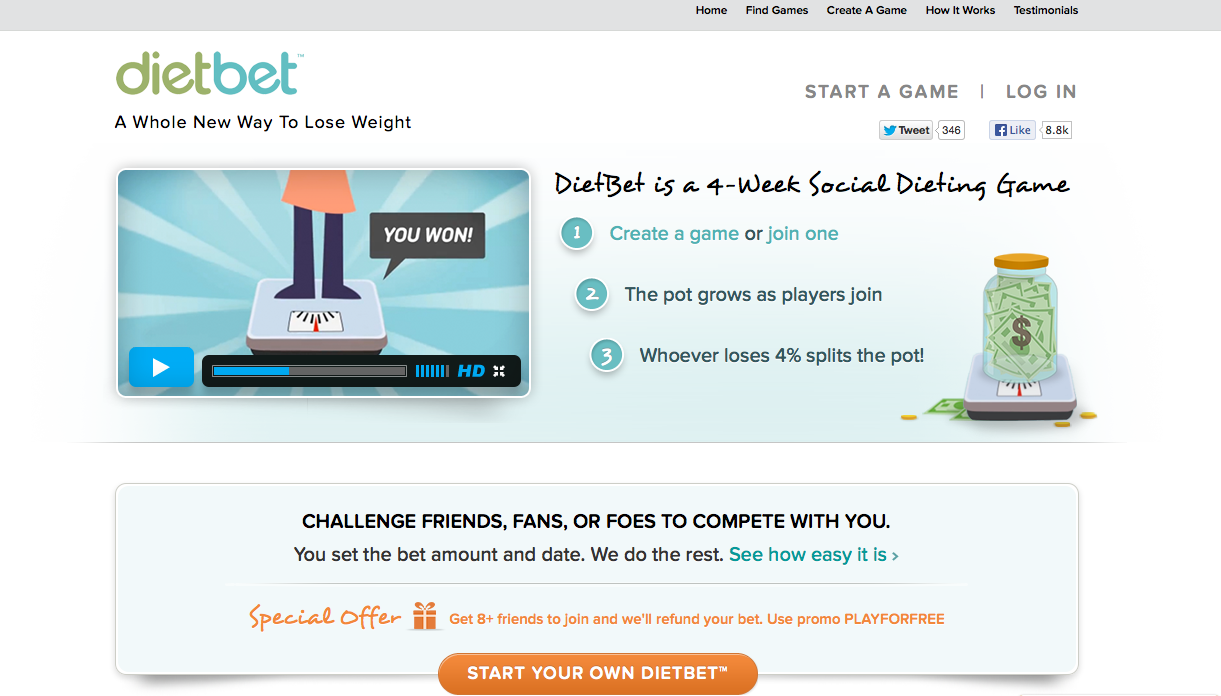
Dietbet in a nutshell: Dietbet is a way to socially challenge your friends to a health challenge. It’s basically like where you all throw money in the pot, and the people who get closest to their goals claim the cash. Pretty sweet right?
Social betting gone digital.
———-
Beyond the online tools and resources to help you conquer emotional eating and food addiction, the point of mental hack #4 is to utilize people to leverage your success.
If you want to gain control over your eating, learn to utilize people in couple ways:
- Build a support group or hang out in online forums where people have the same experience and goals
- Embark on a challenge with a friend (or your entire family)
- State a goal… publicly, and then have friends and family hold you to it (similar to the online programs I spoke of)
People, sometimes more than anything, influence your success or failure.
Mental Hack #5: Become Your Own Coach

Anyone with a chronic health problem has quickly learned that they need to become their own expert.
Beyond just learning everything on the subject, you need to understand your own vulnerabilities, and start experimenting.
It’s almost impossible to really come up with a perfect diet for every person, or a perfect system for every person – which is why experimentation is so important.
For example, if you know that certain foods make you over eat every time – you know you have a personal kryptonite and you should stay away from them.
So how specifically do you experiment and become your own expert?
Use something that I call “definitive documents.”
I’ve unfortunately had a number of various health problems in my life that were chronic and very difficult to solve by western doctors. Usually there were many pieces to the puzzle, and I was left experimenting on my own.
For many of you this will be the same case. Over the years, I found myself creating these word documents called “definitive documents” where I could document every piece of the puzzle I was trying to solve:
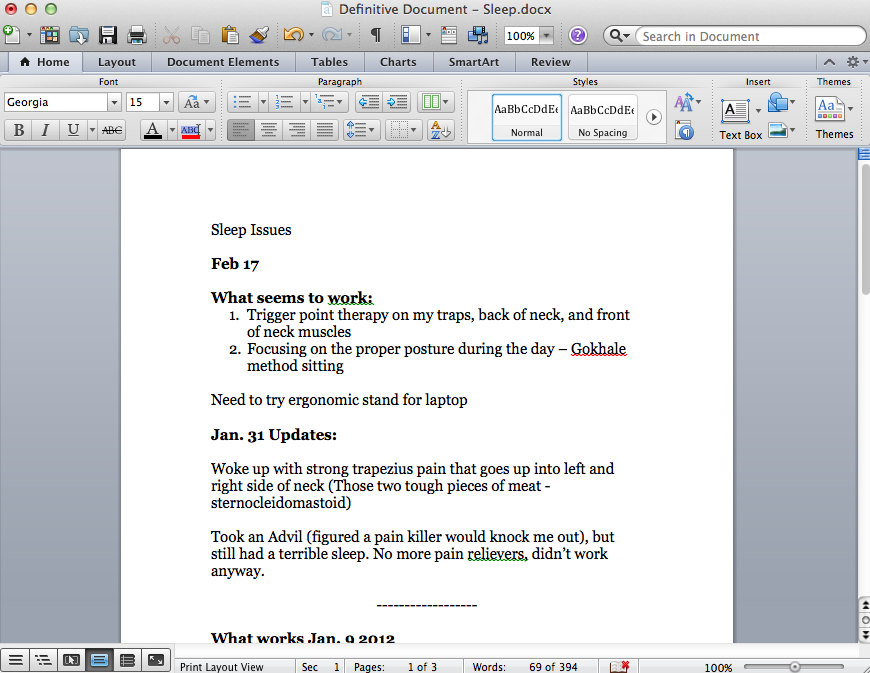
Sample “definitive document” when I had sleep issues
What do you write in them? Everything you know.
For emotional eaters and people that are addicted to food, keep track of the following things:
- Events that trigger episodes; were you out with family? Were you at a business lunch? Were you eating lunch alone? Did you not have time for lunch?
- What kinds of foods are your kryptonite that you end up craving more than others? What foods do you over-eat, every time you eat them?
- Experiments you have tried; does eating oatmeal for breakfast leave you full, or do eggs? What time do you usually get sugar cravings? What has worked to beat your sugar cravings?
We all need to become our own expert, particularly if we have a long-standing chronic problem – often there are many, many interconnected pieces that one person cannot give you.
Come up with a theory or hypothesis, test it, and write down the results in your definitive document. It becomes your own little doctor’s notepad.
Free Report On Food Control: Beating Food Addiction and Emotional Eating
To download the free report, just right click the image below and click “Save file as.” Or you can just click here.
I’ve got a couple goodies in here for you: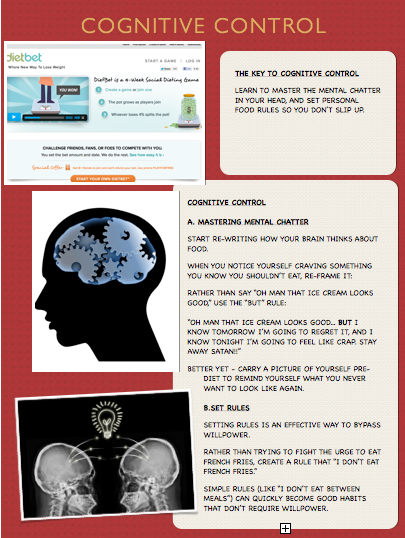
- A 5 part guide for going through these 5 jedi mind tricks
- How to find why you emotional eat, and what to do with that info
- A checklist of the most important things to keep in mind
- … And plenty of other sexy goodies like that ===>


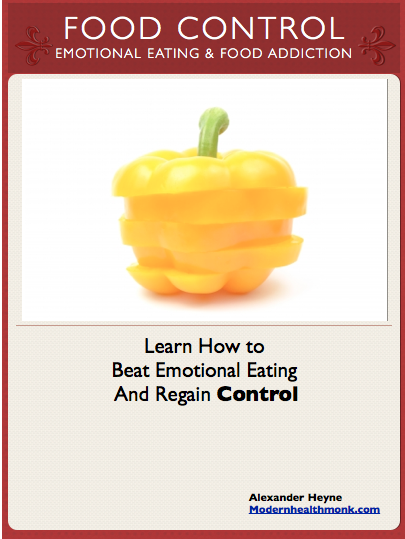
haha, love that! thanks also for the links – I especially love stickk.com!
No problem Nadja 🙂
what books would you recommend on getting distracted from thinking about food and what will help you remember to rehearse what you are going to do before eating?
Hey Rodney,
To be honest, the books mentioned in the post are a really good introduction. But I actually made a complete online training program for people that have really bad sugar cravings and tend to be emotional eaters. If it interests you, check it out here (It’s opening again next month): http://foodcontrolprogram.com/ .
Let me know how it goes!
– Alex
Hi, just wondering if you sell or pass on email addresses? I would really like to get all the information from you I can but don’t want junk mail from other companies or people. You seem like a good karma kind of guy but I thought it best to ask.
Hi Eggshaped,
No, absolutely not. The point of me putting up a health and wellness site was to be transparent and offer value. If you have any questions or concerns you can email me directly: http://modernhealthmonk.com/contact/
Best,
Alex
Hi,
I used to be an anorexic in high school, 8 years down the line I find myself obsessed with food and over weight. I find your links and information really helpful, is there any other advice you can offer?
Lin
Hi Lin,
Can you tell me more about specifically what you’re looking for? Then I can direct you to another useful article.
Best,
Alex
Awesome article!!! I especially appreciate how you addressed willpower and how overeating is not based on a lack of it. I’ve struggled with food my entire life, from bulimia to anorexia, and now compulsive overeating. I’ve overcome my alcohol addiction and quit smoking cigarettes after many years and now am facing my food addiction in the same manner, or at least defining it as an addiction. Redefining it as an addiction actually lessens the struggling recovery as I am no longer in a constant battle with “overcoming” the urge, but rather recognize that I’m having an urge and remembering the rules in which I’ve established for myself. Thanks again for a great article!
No problem Lisa 🙂 Hope it helped!
I googled “diet for people who can’t diet” and found your site. Feels like I hit the jackpot. I’ve been telling my husband I need some sort of counseling because I am messed up when it comes to food. I haven’t read too much here yet but I’m looking forward to sitting down on my computer and reading all that I can soon! I am an emotional eater. Eat when agitated (usually by my kuds misbehavior!) I love sugar. And I think I have some idea that I should get to eat whatever I want and not be controlled by food rules and diets! I need to figure out how to change that idea.
Hey Emily – Totally feel you there! Shoot me an email and let’s talk more, I’d love to hear more of your story.
-Alex
Great tips! I really hope it can help me kick my bad binge habit! I know it is bad, I always binge eat on peanut butter sandwiches/pancakes or laughing cow cheese sandwiches! I just want to eat my bread and can’t stop till I finish a whole loaf of bread and at least 3/4 jar of peanut butter! I’ll be good for a few days and then the cycle starts again and I know I need to stop but I just can’t….I am so addicted to this bad habit!! 🙁
Hey jessie – work through this guide and let me know if it helps provide more insight into why it’s happening.
I must say, out of all the articles I read about “tricks to beat addiction”, they’re usually superficial and devoid of good value, but you, sir, are deep thinker from the way you wrote this. From the style, the easy to read format and above all, a highly intuative approach that only people who gone through addiction could understand.
I will be using some of these tips for my own site and I’ll make sure to credit you because I love the advice of “being your own expert” and pointing out the top two ways people indulge in over eating and teaching us how to address it. I like applying the 80/20 rule in terms of addiction, that is to say, rather than tackling all the issues that makes us crave, we tackle the 20 percent that produces 80 percent of the negative outcomes and vice versa.
One good way I learned to tackle any addiction is using Neural Associative Conditioning. That is associating pain to the habit and pleasure to changing the habit. It’s simple, all i do is anytime i feel cravings or anytime I want to change a habit, I write down the answer to the following questions.
1. What do i want to change and what’s preventing me from changing
2. What will be the cost if I don’t change now? (costs can range from family, health, self esteem, relationships, etc) as long as it’s written with emotional intensity
3. What are the benefits that I get from doing this activity ? (use these benefits to find alternative activities that provide the same benefits)
4. How my life improve if I change right now? (from family, personal, financial, and etc)
Anyways that’s all from me. Take care 🙂
Awesome advice Alex, thanks for sharing! This is really deep stuff, and like you said, fixing emotional eating for some of us is very close to fixing some kind of drug addiction – not easy, and not at all rational. Great tips
I can’t figure out what type I am. I think I’m a combination. Any suggestions?
Hey Elaine,
Can you tell me a bit more about what you’ve spotted so far?
Alexander, this has been some of the best, most insightful stuff I’ve ever read about food addiction and the like. Thank you.
Glad it helped Heather 🙂
After two decades, I was able to manage my addiction to food. The solution came in a book – ‘How To Beat The Weight Loss Blues’ – I found on Amazon in 2016. Now, I am 19 pounds lighter, and, believe it or not, still have some of the foods I enjoy.
Anyone with food addiction should carry this book with them.
Barbara Hawkins
I have been a food addict and emotional eater my whole life and I have always been told that I just need to stop and have willpower. This is the first article that made me feel sane. I am going to study the articles and set up my own personal plan and support system. Thank you for letting me see that I am not crazy
Great Post! Many addictions are similar. The cognitive tactics that you describe are exactly what I recommend for people addicted to weed. I hadn’t considered a ‘definitive document’ before. I’ve used the term ‘action plan’ because it’s always getting modified, but they are quite similar.
Today was the first day I thought of my problems with food as an addiction as I reach for food merely because it is there and because I do not feel happy.
The mental barrier is one I have won before, but obviously haven’t beaten outright because I’m back to square one. I know what is right, I know what I should do and have every intention of doing it until I have a moment in my brain that just says ‘screw it’ and I appear to have no control over it.
I sound stupid, I mean how can I not control my own actions, but when you look at addiction in general you start to understand that it’s not something you do conciously its something your body now craves. How I am going to beat it is beyond me at the moment, but surely recognising it is happening is a good start.. Any ideas/ advice is greatly received because at the moment I just feel a bit like an idiot and that I should be able to just click my fingers and be alright.
Totally Emily – it’s so much deeper than just “lacking self control.” A gross oversimplification.
I think the big thing is – what’s making you unhappy?
It’s not an overall unhappy, mine can be very moment driven, a comment from my boss, having a rubbish day, feeling fat, being lonely. These are all things that drive me in that direction, and I literally have a discussion in my head saying that I don’t need it, but I have the other side fighting saying whats the worst it can do etc. I guess I need a plan like others have mentioned and need to find that ‘zone’ I have been in before – and not get angry with myself because that always makes me eat more. It’s a vicious cycle.